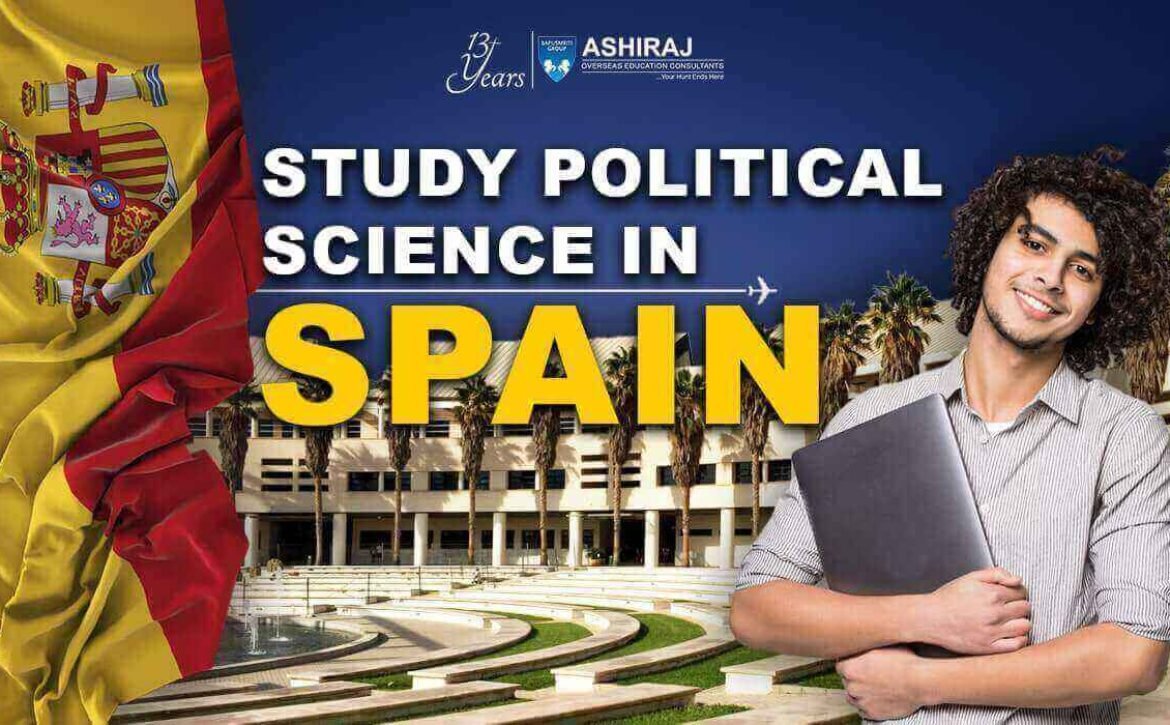
Political Science in Spain
Political Science in Spain encompasses a dynamic field of study that delves into the intricate workings of Spain’s political system, governance structures, and socio-political dynamics. With a rich historical backdrop and a contemporary landscape marked by rapid transformations, studying political science in Spain offers a nuanced understanding of its democratic institutions, political parties, and policy-making processes. From the legacy of Franco’s dictatorship to the evolution of regional autonomy, Spain’s political landscape presents a captivating subject of analysis for scholars and enthusiasts alike.
In the academic realm, Political Science in Spain explores a diverse array of topics, ranging from comparative politics and international relations to political theory and public policy. Scholars engage in rigorous research, examining Spain’s role within the European Union, its approach to immigration and multiculturalism, and the challenges posed by regional nationalism. By studying Political Science in Spain, students gain insights into the complexities of contemporary governance, shaping their understanding of both domestic politics and Spain’s position in the global arena.
Why to Study Political Science in Spain?
- Rich Historical Context: Spain boasts a captivating political history, from the era of Franco’s dictatorship to its transition to democracy in the late 20th century. Studying Political Science in Spain provides a unique opportunity to explore this historical evolution firsthand.
- Vibrant Democratic System: Spain’s democratic system is characterized by its robust institutions, multiparty system, and regional autonomy. By studying Political Science in Spain, students gain insights into the functioning of a modern democratic state and its mechanisms for governance and representation.
- European Integration: As a member of the European Union since 1986, Spain plays a significant role in shaping EU policies and participating in European decision-making processes. Studying Political Science in Spain offers valuable insights into Spain’s integration into the EU and its implications for domestic politics and policies.
- Regional Diversity: Spain is a country with distinct regional identities and autonomy. Studying Political Science in Spain allows students to examine the dynamics of regionalism, nationalism, and decentralization within the Spanish state, offering a comprehensive understanding of its political landscape.
- Global Perspective: By studying Political Science in Spain, students gain a global perspective on political issues, analyzing Spain’s role in international relations, its foreign policy priorities, and its contributions to global governance and diplomacy.
Overall, studying Political Science in Spain provides a multifaceted exploration of political systems, institutions, and dynamics within a rich historical, regional, and global context.
Top Universities to Study Political Science in Spain
University | QS World University Ranking 2023 | Type of University | Average Annual Fees | Programs Offered |
University of Barcelona | 150 | Public | €1,000 €3,000 | Political Science, International Relations |
Autonomous University of Madrid | 180 | Public | €900 €2,500 | Political Science, Public Administration |
Pompeu Fabra University | 200 | Public | €1,200 €3,500 | Political Science, Global Governance |
Complutense University of Madrid | 220 | Public | €800 €2,200 | Political Science, European Studies |
University of Valencia | 250 | Public | €1,000 €3,000 | Political Science, Comparative Politics |
Studying Political Science in Spain opens doors to some of the top-ranked universities globally. The University of Barcelona, renowned for its academic excellence, offers programs in Political Science and International Relations, providing students with a comprehensive understanding of global political dynamics. The Autonomous University of Madrid, another prestigious institution, offers programs in Political Science and Public Administration, preparing students for careers in government, diplomacy, and public service. Pompeu Fabra University, known for its focus on social sciences, offers programs in Political Science and Global Governance, equipping students with the skills to navigate complex global challenges. The Complutense University of Madrid, with its rich history and diverse academic offerings, provides programs in Political Science and European Studies, fostering a deep understanding of European politics and institutions. Lastly, the University of Valencia offers programs in Political Science and Comparative Politics, allowing students to explore political systems and processes across different regions and contexts.
Course Curriculum for Political Science in Spain
- Comprehensive Understanding: The course curriculum of Political Science in Spain offers a comprehensive understanding of the country’s political system, institutions, and processes, providing students with a solid foundation in political theory and practice.
- Comparative Politics: Students delve into comparative politics, analyzing the political systems of Spain and other countries to identify similarities, differences, and patterns, fostering a global perspective on political dynamics.
- European Union Studies: With Spain’s membership in the European Union, the curriculum includes a focus on EU studies, exploring its institutions, policies, and Spain’s role within the EU framework.
- Regional Politics: Given Spain’s diverse regional identities and autonomy, the curriculum covers regional politics, examining the dynamics of regionalism, nationalism, and decentralization within the Spanish state.
- Policy Analysis: The curriculum emphasizes policy analysis, equipping students with the analytical tools to assess public policies, understand their implications, and engage in policy-making processes.
- Research and Methodology: Students learn research methodologies and techniques, enabling them to conduct empirical research and contribute to academic scholarship in the field of Political Science in Spain.
- Internship Opportunities: Many programs offer internship opportunities, allowing students to gain practical experience in government agencies, non-profit organizations, and research institutes, enhancing their professional skills and networks. Overall, the course curriculum of Political Science in Spain prepares students for diverse career paths in politics, public administration, diplomacy, academia, and beyond.
Eligibility Criteria & Admission Requirements for MS in Political Science in Spain
- Language Proficiency: Applicants are required to demonstrate proficiency in English or Spanish through standardized tests such as IELTS or TOEFL. Minimum scores typically range from 6.5 to 7.0 for IELTS and 80 to 100 for TOEFL.
- Standardized Tests: Depending on the university’s requirements, applicants may need to submit scores for GRE or GMAT exams. Competitive scores vary across institutions, but typically range from 155 to 160 for GRE and 600 to 700 for GMAT.
- Academic Certificates: Applicants must provide academic certificates, including transcripts and diplomas, demonstrating completion of a bachelor’s degree or equivalent in a relevant field.
- Work Experience: While not always mandatory, some programs may prefer candidates with relevant work experience in politics, public administration, or related fields.
- Passport & Student Visa: International applicants must possess a valid passport and obtain a student visa to study in Spain. This involves submitting necessary documentation, including proof of acceptance into a program and financial stability.
Test | Minimum Score |
IELTS | 6.5 7.0 |
TOEFL | 80 100 |
GRE | 155 160 |
GMAT | 600 700 |
Political Science in Spain offers a rigorous academic environment, and meeting these eligibility criteria ensures that applicants are well-prepared to thrive in their studies and contribute meaningfully to the field.
Documents Required for Studying Political Science in Spain
- Passport: A valid passport is essential for international applicants, serving as proof of identity and nationality.
- Letters of Recommendation (LOR): Typically, two letters of recommendation from academic or professional sources are required to assess the applicant’s suitability for the program.
- Statement of Purpose (SOP): An SOP provides insight into the applicant’s academic and career aspirations, detailing their motivations for pursuing Political Science in Spain.
- Curriculum Vitae (CV): A comprehensive CV outlines the applicant’s educational background, work experience, academic achievements, and relevant skills.
- Official High School Transcripts: Transcripts from secondary education institutions are necessary to verify academic qualifications and eligibility for higher education.
- Educational Certificates: Applicants must submit certificates or diplomas attesting to the completion of previous academic degrees or qualifications.
- Work Experience Certificate: If applicable, a work experience certificate provides evidence of professional experience relevant to Political Science.
- Proof of Financial Resources: To obtain a student visa, applicants must demonstrate sufficient financial resources to cover tuition fees, living expenses, and other related costs.
Ensuring the timely submission of these documents is crucial for a smooth application process and admission into Political Science programs in Spain.
Admission Process for Political Science in Spain
- Research Programs: Begin by researching Political Science programs offered by universities in Spain, considering factors such as curriculum, faculty expertise, and location.
- Check Eligibility: Review the eligibility criteria for each program, including academic requirements, language proficiency exams (IELTS or TOEFL), and standardized test scores (GRE or GMAT).
- Gather Documents: Collect required documents, including passport, educational transcripts, certificates, letters of recommendation (LOR), statement of purpose (SOP), curriculum vitae (CV), and proof of financial resources.
- Prepare Application Materials: Draft a compelling SOP highlighting your motivations and aspirations for studying Political Science in Spain. Request LORs from academic or professional contacts well in advance.
- Submit Application: Complete the online application form for your chosen programs, ensuring all required documents are uploaded correctly and application fees are paid.
- Await Notification: After submitting your application, wait for notification from the university regarding the status of your application. This may take several weeks or months depending on the institution’s admission timeline.
- Accept Offer and Obtain Visa: If accepted, follow instructions to accept the offer of admission and begin the process of obtaining a student visa. Ensure compliance with visa requirements and deadlines.
- Prepare for Arrival: Once your visa is approved, make necessary arrangements for travel, accommodation, and enrollment in the Political Science program.
Following these steps diligently will facilitate a smooth admission process into Political Science programs in Spain.
“Education is the most powerful weapon which you can use to change the world.”
Nelson Mandela
Cost of Political Science Course in Spain
- Tuition Fees: Tuition fees for Political Science programs in Spain vary depending on the university and program level. On average, tuition fees range from €800 to €3,500 per year for both domestic and international students.
- Living Expenses: Living costs in Spain, including accommodation, food, transportation, and miscellaneous expenses, vary based on the city and lifestyle. On average, students can expect to spend between €600 to €1,000 per month.
- Scholarships and Financial Aid: Many universities in Spain offer scholarships, grants, and financial aid opportunities to help offset the cost of tuition and living expenses for eligible students. These may be merit-based, need-based, or specific to certain demographics or fields of study.
- Part-time Work: International students in Spain are permitted to work part-time during their studies, which can help supplement their income and cover some expenses.
- Health Insurance: Health insurance coverage is mandatory for all students studying in Spain. The cost of health insurance varies depending on the provider and coverage options.
Overall, while studying Political Science in Spain involves certain costs, there are opportunities for financial assistance and part-time work to help manage expenses and make education more affordable.
Scholarships for Political Science Courses in Spain
Scholarship Name | Amount | Application Deadline |
Spanish Government Scholarships | Varies | March-April |
Erasmus+ Scholarships | Varies | Varies |
Fulbright Program | Varies | October |
DAAD Scholarships | Varies | Varies |
Santander Scholarships | Varies | Varies |
Political Science in Spain offers numerous scholarship opportunities to support students in pursuing their academic goals. The Spanish Government Scholarships, available for both domestic and international students, offer financial assistance covering tuition fees and living expenses. The application deadline typically falls in March-April, so applicants should plan accordingly. The Erasmus+ Scholarships provide funding for students to study abroad within the European Union, with varying amounts and deadlines depending on the specific program. The Fulbright Program offers scholarships for American students to study or conduct research in Spain, with an application deadline in October. The DAAD Scholarships, provided by the German Academic Exchange Service, offer funding for German students to study in Spain and vice versa, with deadlines varying by program. Additionally, Santander Scholarships offer financial support for students from Latin America to study in Spain, with deadlines varying depending on the specific scholarship program.
Career Opportunities After Political Science in Spain
Job Profile | Average Salary (EUR) |
Political Analyst | 35,000 50,000 |
Policy Advisor | 30,000 45,000 |
Government Official | 25,000 40,000 |
Diplomat | 40,000 60,000 |
International Relations Specialist | 35,000 50,000 |
Political Science in Spain opens up diverse career opportunities for graduates, with job roles ranging from political analysis to policy advising. As a Political Analyst, individuals conduct research, analyze political trends, and provide insights to inform decision-making processes, with an average salary ranging from €35,000 to €50,000. Policy Advisors work closely with government agencies, NGOs, or think tanks to develop and evaluate policies, earning an average salary of €30,000 to €45,000. Government Officials play crucial roles in administration and governance, with salaries averaging between €25,000 to €40,000. Diplomats represent their country’s interests abroad, engaging in negotiations and diplomacy, with salaries ranging from €40,000 to €60,000. International Relations Specialists focus on global affairs and diplomacy, earning an average salary of €35,000 to €50,000. With a degree in Political Science in Spain, graduates can pursue rewarding careers that contribute to shaping policies and addressing societal challenges.
Frequently Asked Questions About Political Science in Spain
Political Science is the study of political systems, institutions, behavior, and theories, encompassing topics such as governance, democracy, public policy, and international relations.
Spain offers a rich political history, vibrant democracy, and diverse regional dynamics, providing an ideal environment to study Political Science.
Universities such as the University of Barcelona, Autonomous University of Madrid, and Pompeu Fabra University offer renowned Political Science programs.
Admission requirements typically include academic transcripts, standardized test scores (e.g., IELTS, GRE), letters of recommendation, and a statement of purpose.
Yes, various scholarships, including those offered by the Spanish government and international organizations, are available to support Political Science students in Spain.
Graduates can pursue careers as political analysts, policy advisors, government officials, diplomats, and international relations specialists, among others.
Yes, international students are welcome to study Political Science in Spain, with many programs offered in English and opportunities for scholarships and financial aid.
The duration varies depending on the level of study. Bachelor’s programs typically last three to four years, while master’s programs range from one to two years.
While proficiency in Spanish is beneficial for daily life, many universities offer Political Science programs in English, especially at the master’s and doctoral levels.
Political Science students in Spain have access to diverse research opportunities, including participation in academic conferences, internships, and collaboration with faculty on research projects.




